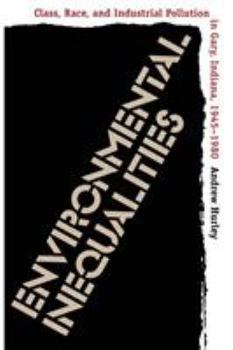Environmental Inequalities: Class, Race, and Industrial Pollution in Gary, Indiana, 1945-1980
Select Format
Select Condition 
Book Overview
By examining environmental change through the lens of conflicting social agendas, Andrew Hurley uncovers the historical roots of environmental inequality in contemporary urban America. Hurley's study... This description may be from another edition of this product.
Format:Paperback
Language:English
ISBN:0807845183
ISBN13:9780807845189
Release Date:February 1995
Publisher:University of North Carolina Press
Length:266 Pages
Weight:0.96 lbs.
Dimensions:0.8" x 6.0" x 9.2"
Related Subjects
Earth Sciences Environmental Policy Environmental Science Environmental Studies History Political Science Politics & Government Politics & Social Sciences Public Policy Science Science & Math Science & Scientists Science & Technology Social Science Social Sciences Sociology State & Local UrbanCustomer Reviews
1 rating
Different sectors of population affected differently by environmental degradation
Published by Thriftbooks.com User , 17 years ago
In Environmental Inequalities, Andrew Hurley traces the dynamics of environmental degradation as experienced by three distinct sectors of society in Gary, Indiana, from 1945 to 1980. Hurley devotes a chapter to each of the particular demographics of three social classes affected by industrial pollution and expansion: white, middle class suburban families, working class whites, largely comprised of ethnic minorities including Serbians, Greeks, Russians, Romanians, Bulgarians, Croatians and Poles among others, and finally a large African-American population (over 35,000 African-American between 1920 and 1950) that migrated from the south in search of employment and improved prospects. Each group was affected by industrial waste in a different, though related, way and each took a unique approach to ameliorating problems specific to its particular group. White middle class activism was largely led by well-educated stay-at-home moms whose primarily concern was preserving their quality of life. Their primary target was containing the spread of industry to their east side neighborhood (Miller) and preventing the spoilage of surrounding natural areas. They focused on extensive research, political lobbying and events (such as picnics) and personal contacts to meet their goals. White working class families tended to stay close to ethnic neighborhoods and churches which meant that they continued to live in areas heavily affected by air and water pollution. Although the union (specifically the U.S. Steelworkers union) was an important protector of their wages, benefits and job safety and security, the union was not as interested in protecting their environmental conditions, particularly when that protection involved a perceived threat to the industry. Eventually church and worker leadership separate from the union ("labor movement radicals") organized around "ethnic power" in reaction to the civil rights movement to address issues "of immediate concern, ranging from garbage collection to taxes" (p. 105). Unlike, the white middle class population, workers' efforts were tempered by the concern over keeping their jobs. African-Americans, after decades of employment in the most dangerous and low-paying sectors of U.S. Steel's factory, finally were able to rally around an African-American candidate for mayor, Richard Hatcher, who was able to make some gains notably in the area of housing by securing a $13 million federal grant. Though pollution was not at the top of Hatcher's priorities, over his 20 year tenure as mayor, he eventually became an important component of the coalition that addressed the appalling conditions, both for workers and residents, around the coke plant. A particularly remarkable effort documented by Hurley, is the concerted effort involving all three of the demographic groups discussed in his book. In 1970, these groups were able to find a common ground of concern and combine their efforts to force U.S. Steel to rebuild coke oven doors and




